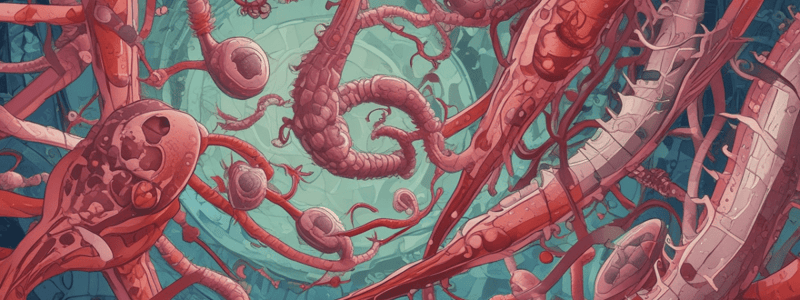Podcast
Questions and Answers
What is a limitation of direct wet preparation?
What is a limitation of direct wet preparation?
- It requires a large portion of stool
- It cannot demonstrate motility
- It cannot detect helminth eggs
- It cannot be performed on fixed specimens (correct)
What is a possible cause of black stool?
What is a possible cause of black stool?
- Bile duct obstruction
- Lower GI bleeding
- Upper GI bleeding (correct)
- Helminth infection
What type of organism can be detected using direct wet preparation?
What type of organism can be detected using direct wet preparation?
- Fungi
- Protozoan trophozoite (correct)
- Bacteria
- Virus
What is the purpose of adding iodine to the stool mixture in direct wet preparation?
What is the purpose of adding iodine to the stool mixture in direct wet preparation?
What is a possible cause of red stool?
What is a possible cause of red stool?
What is a characteristic of direct saline wet preparation?
What is a characteristic of direct saline wet preparation?
What is a possible cause of pale yellow stool?
What is a possible cause of pale yellow stool?
What is an alternative to direct wet preparation?
What is an alternative to direct wet preparation?
What is a disadvantage of PVA-preserved specimens containing Schaundinn solution?
What is a disadvantage of PVA-preserved specimens containing Schaundinn solution?
What is an alternative to the use of PVA and Schaundinn fixative?
What is an alternative to the use of PVA and Schaundinn fixative?
What is the significance of the color of stool in macroscopic analysis?
What is the significance of the color of stool in macroscopic analysis?
What is the purpose of macroscopic analysis in stool specimen processing?
What is the purpose of macroscopic analysis in stool specimen processing?
What is a characteristic of a soft or liquid stool in macroscopic analysis?
What is a characteristic of a soft or liquid stool in macroscopic analysis?
What is the purpose of microscopic analysis in stool specimen processing?
What is the purpose of microscopic analysis in stool specimen processing?
What is a characteristic of formed stools in macroscopic analysis?
What is a characteristic of formed stools in macroscopic analysis?
What is an advantage of single-vial systems in stool specimen processing?
What is an advantage of single-vial systems in stool specimen processing?
What is a disadvantage of PVA-preserved specimens?
What is a disadvantage of PVA-preserved specimens?
What is the significance of stool consistency in macroscopic analysis?
What is the significance of stool consistency in macroscopic analysis?
Which of the following parasites can be recovered from examining sigmoid material?
Which of the following parasites can be recovered from examining sigmoid material?
What is the importance of examining material from ulcers obtained by aspiration or scraping immediately?
What is the importance of examining material from ulcers obtained by aspiration or scraping immediately?
What is the typical blood sample processing procedure?
What is the typical blood sample processing procedure?
What is the purpose of collecting five daily specimens for Enterobius vermicularis (pinworms)?
What is the purpose of collecting five daily specimens for Enterobius vermicularis (pinworms)?
When is the best time to collect a specimen for Enterobius vermicularis (pinworms)?
When is the best time to collect a specimen for Enterobius vermicularis (pinworms)?
What is the purpose of using the Knott technique in blood sample processing?
What is the purpose of using the Knott technique in blood sample processing?
What is the advantage of using thick smears in blood sample processing?
What is the advantage of using thick smears in blood sample processing?
What is the purpose of using cellophane tape preparation?
What is the purpose of using cellophane tape preparation?
What type of parasite is often detected using skin snips?
What type of parasite is often detected using skin snips?
What is the purpose of a 30-minute incubation period in skin snip examination?
What is the purpose of a 30-minute incubation period in skin snip examination?
Which of the following would require quantitation in an assay?
Which of the following would require quantitation in an assay?
What is the typical container used to collect material obtained via mouth scrapings and nasal discharge?
What is the typical container used to collect material obtained via mouth scrapings and nasal discharge?
What is the purpose of making a small cut into the skin using a razor blade in skin snip collection?
What is the purpose of making a small cut into the skin using a razor blade in skin snip collection?
Why are permanent stains sometimes used in the examination of mouth scrapings and nasal discharge samples?
Why are permanent stains sometimes used in the examination of mouth scrapings and nasal discharge samples?
What is a characteristic of microfilariae in a saline solution?
What is a characteristic of microfilariae in a saline solution?
Which of the following parasites can be detected using mouth scrapings and nasal discharge samples?
Which of the following parasites can be detected using mouth scrapings and nasal discharge samples?
What is the primary reason for collecting blood specimens without anticoagulant for parasite detection?
What is the primary reason for collecting blood specimens without anticoagulant for parasite detection?
Which type of blood sample is ideal for observing the morphology of parasites?
Which type of blood sample is ideal for observing the morphology of parasites?
What is the primary purpose of the Knott Technique?
What is the primary purpose of the Knott Technique?
What is the recommended time frame for preparing a blood smear if malaria is suspected?
What is the recommended time frame for preparing a blood smear if malaria is suspected?
What is the primary specimen of choice for the detection of Ascaris lumbricoides and Hookworms?
What is the primary specimen of choice for the detection of Ascaris lumbricoides and Hookworms?
What is the purpose of using N-acetylcysteine in the examination of stool samples?
What is the purpose of using N-acetylcysteine in the examination of stool samples?
What is the medium used for the recovery of Leishmania spp. and Trypanosoma cruzi?
What is the medium used for the recovery of Leishmania spp. and Trypanosoma cruzi?
Why is it essential to ensure that capillary blood is free-flowing and not contaminated with alcohol?
Why is it essential to ensure that capillary blood is free-flowing and not contaminated with alcohol?
Flashcards are hidden until you start studying
Study Notes
Disadvantages of PVA
- Contains mercuric chloride, which can be harmful to health
- Difficult to dispose of
- PVA-preserved specimens have a long shelf life when stored at room temperature
- Poor adhesion of liquid or mucoid specimens to slides
Alternative Single-Vial System
- Free of formalin and mercury
- Can be used for concentration techniques and permanent stained smears
- Some products can be used for performing fecal immunoassay
Sodium Acetate Formalin (SAF)
- Used in concentration techniques and permanent stained smears
- Viable alternative to PVA and Schaundinn fixative
- Mercury-free
Clinical Parasitology Laboratory
Specimen Processing
- Macroscopic analysis of stool involves determining color and consistency, and screening for gross abnormalities
- Stool consistency can indicate potential parasites present
- Soft or liquid stool may suggest presence of protozoan trophozoite
- In formed stools, protozoan cysts are likely to be recovered
Microscopic Analysis
- Done to detect presence of parasites in stool specimen
- Involves three distinct procedures: direct wet preparation, concentration technique, and permanent staining
Direct Wet Preparation
- Performed with unfixed stool mixed with saline or iodine
- Demonstrates motility of organisms
- Detects protozoan trophozoites, protozoan cysts, oocysts, helminth eggs, and larvae
Concentration Techniques
- Used to detect presence of parasites in stool specimen
Permanent Staining
- Used to detect presence of parasites in stool specimen
Stool Color and Possible Cause
- Black: upper GI bleeding, iron therapy, charcoal, or bismuth
- Red: lower GI bleeding, beets, or Rifampin
- Pale Yellow: bile duct obstruction
- White, Gray: barium sulfate
- Green: biliverdin, oral antibiotics, or green vegetables
Cellophane Tape Preparation
- Used to recover Enterobius vermicularis (pinworms) eggs
- Specimen of choice for recovering E. vermicularis eggs
- Adult female pinworm may also be seen
- Specimen must be collected in the morning before patient washes or defecates
Other Specimens for Parasitic Recovery
- Blood smears can be prepared from fresh whole blood without anticoagulant or from venipuncture collection without anticoagulant
- Blood from fingertip or earlobe yields the best morphology of parasites
- Specimens for parasite study must be collected by aseptic technique
- Anticoagulant causes distortion to the staining process and parasite morphology
Blood Sample Techniques
- Knott technique: designed to concentrate blood specimens suspected of containing low numbers of microfilariae
- Buffy coat slides: used in cancer patients
- Cultures: blood and other specimens may be performed to recover parasites
Urine and Genital Secretions
- Urine is the specimen of choice for detecting Schistosoma haematobium eggs
- Other parasites that might be seen on sputum or genital secretions include Schistosoma spp.
Skin Nips
- Useful in detecting Onchocerca volvulus
- Skin snips may be made using a specially designed tool or a razor blade
- The resulting material can be placed in saline and incubated for 30 minutes before microscopic examination
Studying That Suits You
Use AI to generate personalized quizzes and flashcards to suit your learning preferences.




